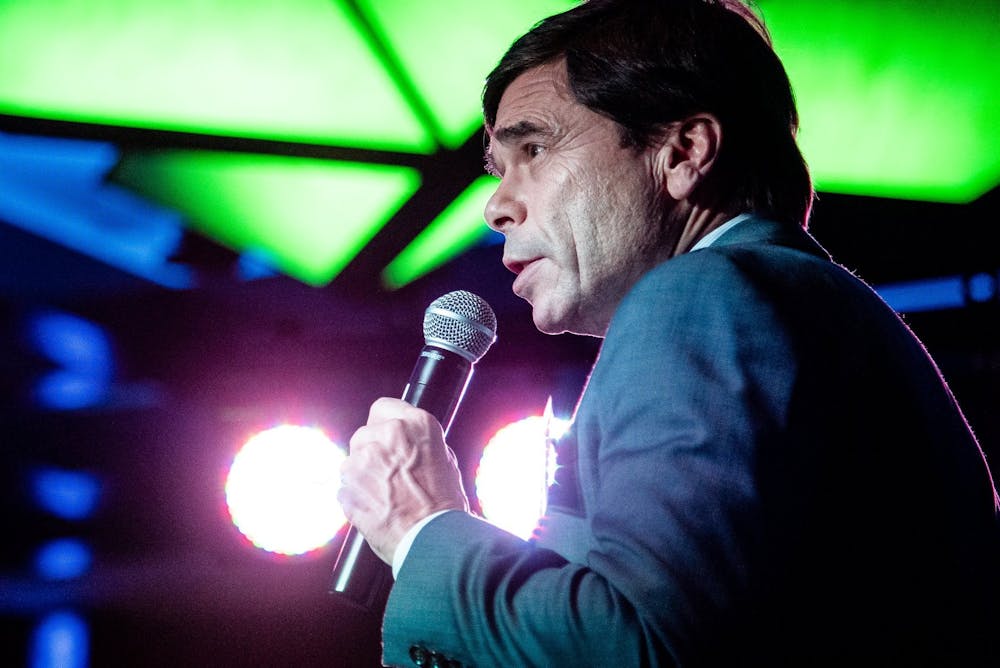Q&A: Pulitzer Prize winning reporter Mike Rezendes talks journalism

Only four months after 9/11, the entire country would again be rocked by a wave of devastating headlines.
Mike Rezendes is a member of the Boston Globe's Spotlight Team, an elite group of investigative reporters that uncovered one of the biggest scandals in Boston's history.
In 2001 Rezendes and his team members investigated sexual assault in the Roman Catholic Church. Specifically, Boston Cardinal Bernard F. Law's coverup of former priest John J. Geoghan's rapes and molestations of more than 130 children. By migrating Geoghan from parish to parish, Law green-lighted assault after assault.
The bombshell story paved the way for additional investigations that caused the arrests of dozens of priests in the Boston area.
In 2003, Rezendes received a Pulitzer Prize in public service for his writing and reporting.
He is a co-author of "Betrayal: The Crisis in the Catholic Church," and a contributor to "Sin Against the Innocents: Sexual Abuse by Priests and the Role of the Catholic Church."
The 2015 film "Spotlight" received the academy award for best picture and best original screenplay for its portrayal of the Spotlight Team's investigation. Rezendes was played by Mark Ruffalo who won an academy award for best supporting actor.
Rezendes traveled from his New York home to Mount Pleasant to help celebrate and commemorate 100 years of Central Michigan Life on Nov. 16. On stage, Rezendes guided the crowd of working journalists through the Spotlight team's most groundbreaking story.
The veteran reporter spoke with CM Life about how journalism weaved itself into his life and provided an outlook on the future of the industry.
When did you begin falling into journalism?
When I was midway through college at Boston University. I had dropped out to write a novel, I was an English major... the novel didn't go so well. When I got back to school I thought maybe I could write for a newspaper because it would give me practice writing and I was also really interested in politics. I took one journalism class and the professor thought the best way to learn journalism was by doing it. We had an assignment to volunteer at a local newspaper and write a story and get it published.
I didn't have a car so I picked one I could get to by subway. I showed up one night at a staff meeting and it was a bunch of people in folding chairs in a circle. They were discussing passionately and even arguing about what should be in the next issue.
This was a rabble-rousing newspaper that was working in a low-income community trying to use journalism to make things better in the neighborhood. I sat with the editor, he gave me a story, I wrote it and boy, if they didn't publish it!
I fell in love with this paper and I worked there as a volunteer reporter for my junior and senior year and after I graduated they offered me the job of editor.
What is the most redeeming aspect of the job?
These days (in journalism) you have to be good at a lot of things... I like taking a piece of dense, investigative reporting and using narrative writing techniques to try to bring it alive and make sure people actually read it.
I also found out I'm a good investigator, which I didn't know before I got into this. I really enjoy putting the pieces of a puzzle together, following a lead and digging and digging. That can be a little addictive.
What is your best advice for student journalists?
Given the rough environment for a lot of student newspapers, of course, I'm thinking about what happened at Northwestern and everything with the Harvard Crimson, It might be a good exercise to have a conversation about your values and your principles.
That way, when trouble erupts or you get criticized you can ask yourselves, 'Did we abide by our principles? Did we abide by the guidelines and the goals we set for ourselves?'
You're going to get criticized, particularly these days. Some of it is going to be justified and some of it's not. You need to be able to tell the difference
Why is journalism so vital?
Democracy would not exist without journalism and the free flow of information. People cannot function correctly in a democracy without the information they need to make decisions. It plays a pivotal role in our society.
I'm worried about the crisis in local journalism today. Something like 2,000 newspapers have folded in the last decade. It's a very, very serious situation.
So, how do we remedy the business model?
I'd like to get some of the folks in business schools to try to solve this problem and help us come up with a viable model. There's a lot of experimentation going on today which I think is great.
There's experimentation in a non-profit model, a lot of organizations have seen success with that. I'm thinking not just of the big, international outlets like ProPublica but also the Texas Tribune, for instance.
Could you imagine yourself doing anything other than journalism?
I have a degree in screenwriting and I've written some screenplays. I've sold one but I haven't had one made yet. So if I weren't a journalist I would probably be spending my time writing some screenplays.
I'm sort of slated to doing a documentary and maybe a podcast. So doing journalism in some of the different platforms, I'm on the cusp of getting involved in some of that right now and I'm looking forward to it.






